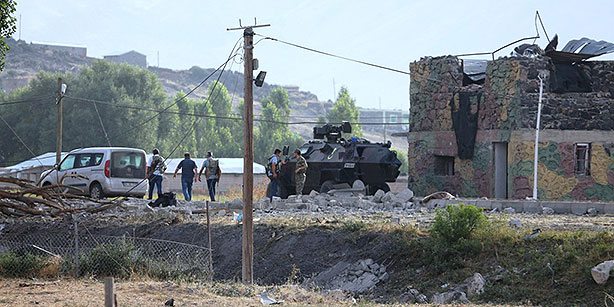Turkey vows ‘whatever necessary’ in fight against militants
The attack last week by fighters from the Kurdistan Workers’ Party (PKK) on the pipeline carrying Kurdish and Kirkuk oil to Mediterranean port of Ceyhan is part of a wider surge in violence by the PKK, targeting Turkish security forces and infrastructure after Ankara launched air-strikes against the group in northern Iraq.
The suspected PKK suicide bomber drove a tractor laden with two tons of explosives up to the military station in the Dogubayazit district, the official Anatolia news agency reported, quoting the local governor’s office.
In the same province, units of the Turkish antiterrorist police on Friday killed three alleged militants or PKK sympathizers during raids on their homes, two days after a soldier died when attackers fired a grenade launcher at an armored auto. Ankara is anxious that Kurdish gains in Iraq and in Syria will encourage a revival of the Kurdish insurgency in Turkey in pursuit of an independent state.
The government has vowed to press on with the over week-long bombing campaign against the PKK, saying on Saturday that “for the peace and security of our people, the fight against terror organisations will continue without interruption”.
The Turkish army has insisted the air force bombing in the Zarkel region of northern Iraq hit a “terrorist camp” and not a civilian village.
The violence also comes with Turkey still without a permanent government since June 7 legislative elections, when the ruling Justice and Development Party (AKP) lost its majority, much to Erdogan’s chagrin.
Iraq’s Kurdish regional government called on the PKK to withdraw from Iraq’s Kurdish territory to prevent civilian deaths, and it condemned Turkey for bombing civilians.
Yet the PKK’s relations with the autonomous Iraqi Kurdish authorities in Erbil have been beset by tensions, while Iraqi Kurds have expanded economic cooperation and relations with Turkey.
Anthony Cordesman, a CSIS military expert, said the deal with Turkey was likely good for overall U.S. strategy in the Middle East. But, he said: “One of the problems is we keep trying to describe this as if it were black and white, and what you’re really watching again is three-dimensional chess with something like 9 players and no rules”.
Violence tied to the PKK, which is fighting for more Kurdish autonomy in the region, has left more than 40,000 people dead since the 1980s.
The campaign has raised suspicions among Kurds that Turkey’s real agenda is to ensure that Kurdish territorial ambitions are halted rather than fighting Islamic State militants. He also demanded that Turkey refrain from bombing civilians. CHP chief Kemal Kilicdaroglu said in a television interview late Sunday that whereas Prime Minister Ahmet Davutoglu “really wants” to form a coalition government Erdogan was blocking an alliance. He said it could have a serious negative impact on the fight against ISIS.












